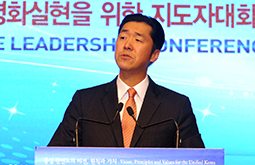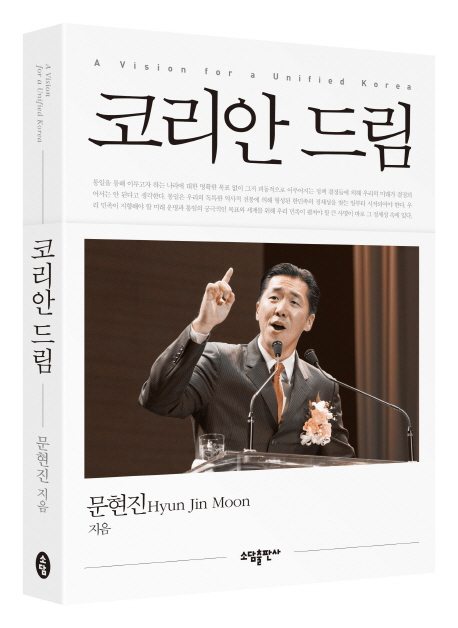Opening Plenary Keynote Address, Global Peace Leadership Conference 2014, Seoul, Korea
Grand Hilton Hotel
September 29, 2014
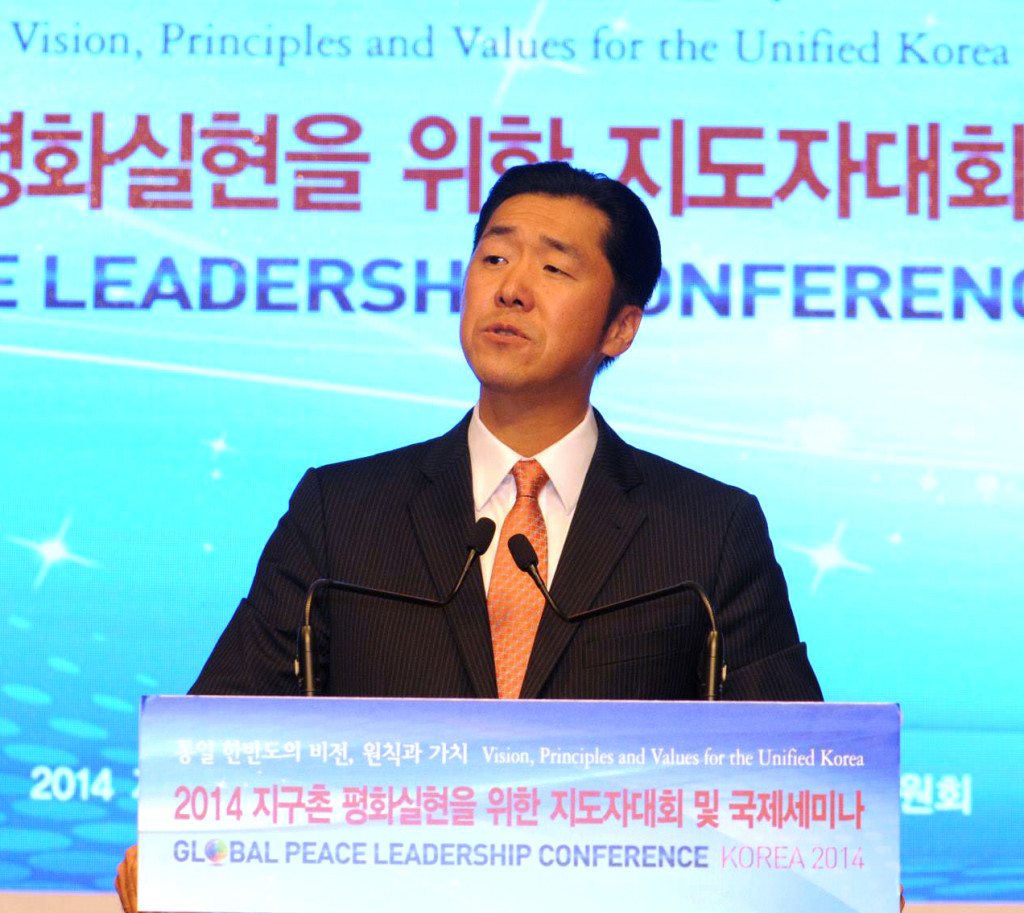
Dr. Hyun Jin Moon addresses global leaders and experts convened at the Global Peace Leadership Conference 2014 in Seoul, Korea.
Distinguished guests, ladies and gentlemen:
I would like to thank you all for your time and leadership contribution at this Global Peace Leadership Conference on the theme of “Vision, Principles, and Values for a Unified Korea.” We are gathered at a truly important inflection point in the proud history of the Korean people and our shared quest to realize a unified homeland.
I would like to thank our partners Dr. Se Il Park of the Unification Arrangement Committee and Honorary Professor at Seoul National University, and Lee Gapsan and other leaders of Action for Korea United.
From the political sphere, I am happy to recognize the Members of the National Assembly who are joining us today, the Honorable Sung Tae Kim, the Honorable Myung Chul Cho, and the Honorable Young Kyo Seo and the many other political figures who are with us here.
We are also very pleased to welcome the representatives of six great faith traditions in Korea.
I wish to thank the Co-Chairmen of the Organizing Committee, Honorable Lee Maan Eee and Venerable Young Dam, Dr. Kwak Tae Hwan, Dr. Jin Shin and the many supporting scholars who have joined us.
Our esteemed international guests include Dr. Edwin Feulner, founder of the prestigious Heritage Foundation in Washington D.C., Dr. Victor Cha, Korea Chair of the Center for Strategic and International Studies, Dr. Robert and Mrs. Donna Schuller of the Coalition for American Renewal, Dr. Feng Zhu from Nanjing University, as well as key leaders of the Korean diaspora from Japan, China and the US.
Let us give them and the entire Organizing Committee a warm round of applause.
Unification Takes Center Stage
In the three years since the Global Peace Foundation held its annual convention here in Seoul, the landscape regarding Korean unification has changed dramatically. Back then, many South Koreans had little interest in the issue. They thought it would happen in a far distant future, if it happened at all.
But we continued forward, confident that the long cherished idea of Korean unification would become a pressing issue much sooner than most people expected. And that is exactly what happened. Kim Jong Il died suddenly and his son, Kim Jong Un, quickly showed himself to be both inexperienced and unpredictable. The resulting instability in the North presents a significant threat to the Korean peninsula and to the region leading many to see unification as the only path to resolve the present uncertainties.
Consequently, South Korean government policy is now to actively pursue peaceful unification by seeking to engage the North through a number of channels, as President Park expressed in her Dresden Declaration earlier this year. These include proposed infrastructure projects, as well as cultural exchanges with the North Korean people.
In policy discussions within South Korea there is now much greater focus on the potential benefits that will flow from peaceful unification. As South Korea’s ambassador to the United States told a recent CSIS conference in Washington, DC, “Unification is no longer a question of if but when.” How to prepare for it, therefore, has become a matter of urgent discussion.
Vision and Principles: Unification and the Korean Dream
The focus of this conference, namely the vision, principles and values that will undergird and guide a unified Korea, is an essential part of the preparation for unification, yet it has not been sufficiently discussed. You might call it the missing dimension of unification. To awaken Koreans to the importance of this dimension in preparing for a historic transformation, I wrote the book, “The Korean Dream,” and organized this conference, the latest in a series we have held over the past five years in Korea, Mongolia and the United States.
A tremendous amount of work is already underway in government and think tanks to prepare for the challenges that might arise on the road to unification. However, true peace can never be built upon economic and political effort alone, nor through piecemeal social interaction and cultural exchange. These are all parts of a process that need to be framed within a vision that defines the end goal and directs them towards it.
That is what the Korean Dream is about. It answers the key questions about ends. Unification will create a new nation, rich with new possibilities. What sort of nation should it be? What principles and what values should guide and sustain it?
And make no mistake; these are questions that must be addressed now, as the course of history is presenting Koreans today with a unique opportunity. We have the chance to end the division of Korea because the geopolitical circumstances that created two Koreas have dramatically changed. A divided homeland was never the desire of the Korean people. At the end of World War II in 1945 they wanted to enjoy the freedom of an independent and united nation.
The geopolitics of the Cold War thwarted that desire and imposed on Koreans this division that has lasted for 66 years. However, the Cold War ended a quarter of a century ago. The Soviet Union no longer exists and the alliance structure that once supported the North Korean state is gone.
As a result, North Korea has become increasingly isolated and economically dysfunctional. China, its longtime supporter has grown increasingly frustrated with Pyongyang’s intransigence over its nuclear weapons and economic modernization. There is no longer anything special about the former “special relationship” between the two countries.
Because of these changes we Koreans now stand in a position to take control of our own destiny and finally realize the aspirations for the nation that fired the minds and hearts of the 1945 generation. To grasp this opportunity we need to move forward with a clear vision of the future based upon the principles and values that have shaped Korean identity and defined Korea’s destiny.
What Is the Korean Dream?
As I point out in the book, to prepare for the future we need to look to the past. The roots of Korean identity lie with Korea’s founding, in the story of Dangun, the legendary founder of Gojoseon and the principles upon which the nation was built. These were Hongik-Ingan, Ido-yeochi, Kwangmyung-ise, and Jaesae-ihwa.
The founding spirit can be summarized by the core principle of Hongik-Ingan with its remarkable exhortation that the Korean nation and people should live for the “benefit of all humanity.” This ideal was to be implemented through the other three principles. Thus, Dangun aspired to govern the world with “morality and truth” (Ido-yeochi), thereby “enlightening the world with truth” (Kwangmyung-ise) and thus “creating a world of truth” (Jaesae-ihwa).
These principles run like a thread through Korean history, especially Hongik-Ingan . They were the compass that guided Koreans through suffering and tribulation and helped them to digest it. They were the seeds of a national spiritual consciousness that was forged through the historical experiences of the Korean people and then brought to bear on every aspect of practical life.
These principles and the spiritual consciousness they produced became embedded in the Korean psyche and a part of our cultural heritage through the extended family tradition. In such a family, a child grows up supported within a rich web of relationships, embraced by grandparents, parents, aunts, uncles, cousins and others. In that environment he or she learns the moral virtues and responsibilities of every type of relationship from the people who love them most.
This is the foundation of an ethical society through which virtue is nurtured and passed on through the generations. As I explain in the book, the family is the place where moral education to raise future citizens takes place and it does so at a level of intimacy that develops the most deeply rooted moral qualities. Here principles are transformed into practice and become the values we live by.
These are the elements of the Korean Dream. Together they have shaped the unique Korean identity, an identity we have to recover in order to shape our own future and fulfill our destiny. For unification will be about much more than ending the 66 years of political and ideological division. It will present the Korean people, North and South, with the opportunity to reconnect with the long arc of Korean history and bend it forward toward a future in which not only will Korea be united but it will also become a powerful voice for peace in the world.
By formulating a guiding vision, the Korean Dream is changing the way people think about unification. It is creating consensus where before there was division. It is a bitter irony that over the past half century Koreans have been locked into the box of ideological conflict even though the argument did not begin with us. The Korean Dream offers a way out of the box through its broad perspective. It offers a new alternative so that Korean people can think of the possibility of creating a nation rooted in their unique history and traditions.
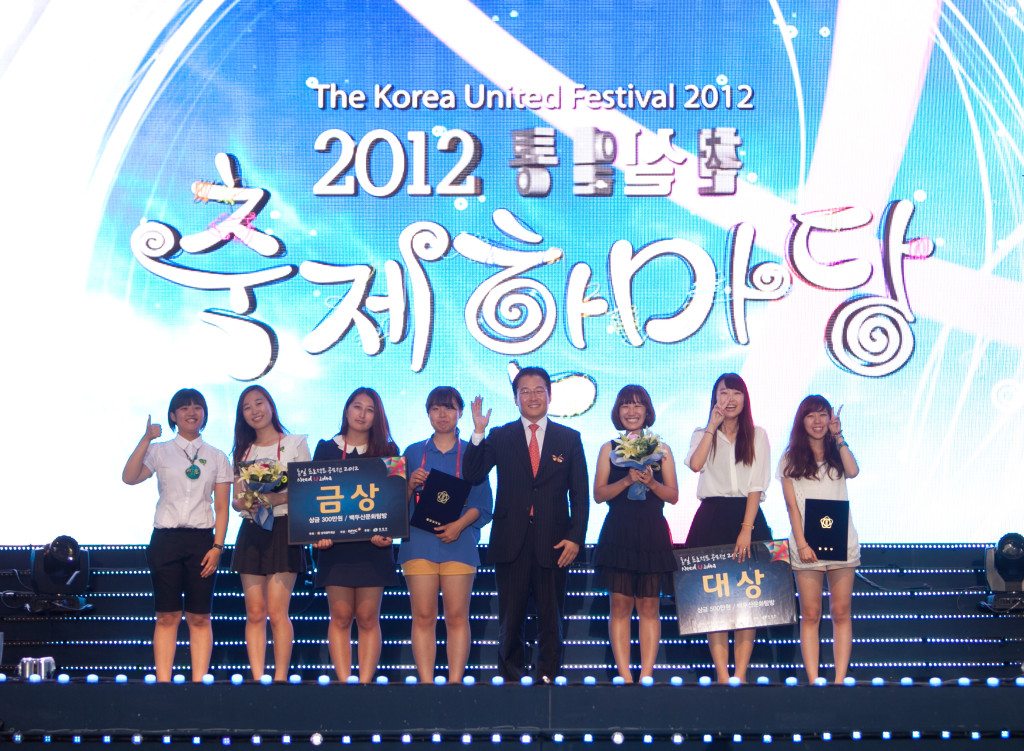
Winners of the 2012 Need U Idea Korean unification competition. Since then the competition has expanded to include university, high school and middle school students.
Up until now South Koreans have been divided along ideological, political, and religious lines in their approach to unification and their conception of Korea’s future. Today, however, this vision is inspiring cooperation, for the first time, between liberals and conservatives, and among religious groups, civic leaders, and political parties.
It is also building a bridge of common identity connecting us to the North Korean people. Unification is first and foremost the joining together of a separated people. For South Koreans it is a moral imperative to bring an end to the oppression and deprivation suffered by our North Korean cousins, who are the same race, speak the same language, and share the same history and culture as we do.
The power of popular movements guided by a moral vision to bring profound social and national transformation is something I highlight in my book. The twentieth century offered many examples.
The Global Peace Foundation was instrumental in creating Action for Korea United in 2012. AKU is a broad coalition of nearly 400 civic groups, representing a wide range of religious, political, humanitarian, and human rights organizations engaged with North Korean issues. Through AKU, consensus on the vision and principles that should guide unification is taking shape and the activities of many diverse organizations are being coordinated. It is a civil society movement of citizens wanting to make a difference, in contrast to top-down, government initiated projects. As such it offers an ideal partner for public-private cooperation.
Action for Korea United will be reaching out to every corner of our nation from Pusan to the Han River and beyond the 38th parallel to our cousins in the North. AKU is also issuing a clarion call to connect our nation with the Korean diaspora throughout the world.
The Korean Dream and World Peace
The Korean Dream does not end with the unification of the Korean peninsula. Rooted as it is in the Hongik-Ingan ideal of living for the benefit of humanity, its vision reaches out from the nation to the world.
One of the leaders of Korea’s independence movement, Baekbom Kim Gu, whom I mention in my book, captured the sentiment of the patriots of that time when he wrote, “I wish my nation would be a nation that doesn’t just imitate others, but rather it be a nation that is the source of a new and higher culture, that it can become the goal and an example [for others]. And thus true world peace could come from our nation;”
This is the destiny towards which our history is directing us. Unification is the next significant step toward realizing that destiny. To achieve it, we must revive those core ideals that still burn deep within the Korean consciousness. The time is ripe today to do this, while we Koreans are reflecting deeply on who we have become, in the wake of the Saewol ferry tragedy.
The situation of the world today cries out for leadership and models of peace. A Korea united through the vision of the Korean Dream would exemplify the sort of leadership that the patriotic leaders of the Independence movement aspired to.
A Vision that Can End Identity-Based Conflict
When the Cold War ended there was great hope that a world of peace would ensue. Instead, as the global ideological rivalry of the two superpowers came to an end, the geopolitical constraints it had exercised disappeared as well. Conflicts sprang up everywhere based on tribal, ethnic, and most of all religious, differences. Such identity-based conflicts present the greatest threat to world peace today.
Military force alone can never resolve this type of threat. The resolution must begin with a vision based upon universal principles and values that upholds our common humanity, transcending the narrow forms of identity that produce conflict. That vision must then be made into a reality by a movement of people who become its owners, then create initiatives and establish institutions that give it substance and form.
A vision that can encapsulate our shared principles and common identity can be found in the affirmation that we are all members of One Family under God. Based on evidence of success that the Global Peace Foundation has already demonstrated in hot spots in East and West Africa and Southeast Asia, it is my firm conviction that the vision of One Family under God can transcend identity-based conflict and provide the principled foundation for creating a world of peace. I am further convinced that a united Korea guided by the Korean Dream can become the leading global advocate for this vision.
A united Korea committed to universal principles and values that uphold human rights and freedoms will exercise tremendous moral authority through its example. The influence such principles can have on history is demonstrated by the U.S. Declaration of Independence.
The principles it enunciates, that “all men are created equal and endowed by their Creator with certain unalienable rights,” remain as a timeless inspiration for peoples everywhere seeking to secure fundamental rights and freedoms. A united Korea would offer similar inspiration, and most especially with the nations of the developing world today.
Korea and the Developing World
The developing world is likely to exercise a growing influence over the global future. Western models of development are now being questioned, after the 2007-2008 global financial crisis was precipitated by western financial institutions. Countries in the developing world are open to new leadership and new models of development and Korea is ideally placed to provide both.
More importantly, many of these nations are looking for a path to a prosperous future that does not strip away their traditional spiritual and cultural values. They often find more in common with the values nurtured within the Korean extended family model than those promoted by the more extreme secular liberal ideas coming out of the West. This makes Korea a natural partner for them.
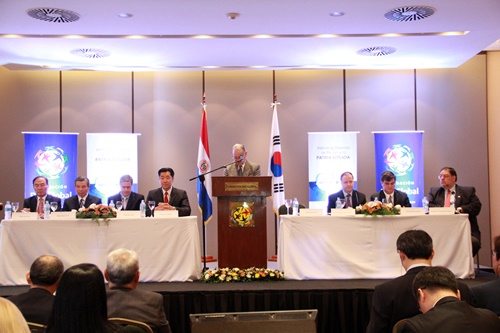
Dr. Altamirano, director of the Paraguayan think-tank Institute for the Development of Thought, addresses participants of its first symposium on Korea-Paraguay relations.
The Foundations of National Transformation
The Global Peace Foundation has been active throughout the developing world establishing model projects that address major challenges such as identity-based conflict and give practical expression to the vision of One Family under God.
We have been particularly active in Paraguay, developing a model for national transformation and connecting it with Korea. The annual Global Peace Convention will be held there this year and has attracted 18 former Latin American heads of state to examine the model and its application throughout the region.
Our work in Paraguay began with projects to promote the principles and values that are the necessary foundation for a well-functioning, free-market democracy. This created greater social and political stability particularly in addressing the problem of corruption.
I then brought Korean infrastructure experts and investors to Paraguay to partner in a comprehensive development strategy. Once its infrastructure is sufficiently developed, Paraguay is perfectly placed to enter the global economy as a hub nation for regional development. Korea will be the key partner in this process.
This will not only open the door to new markets in the Latin American region. It will also place Korea in a key leadership role there in bringing about economic development as well as promoting the social and political transformation needed to sustain that development. Based on such a track record, Korea could play a similar role in other regions of the developing world.
And most importantly for our focus here today, the experience of lifting up an underdeveloped nation to become a part of the global economy will be invaluable in meeting the post-unification challenges of transforming North Korea into a free, just and prosperous country that that can function in the modern world. All of this shows that Korea is poised to lead in the world but first we have to resolve the painful legacy of the past and heal the division at home.
Conclusion and Call to Action
Today, Korea stands at a crossroads facing a historic choice. What is at stake is the future of the Korean people for generations to come. We can accept the current state of a divided peninsula with the ever-present possibility of another fratricidal war. Or we can determine a new path driven by our destiny to create a unified homeland and to “broadly benefit all humanity.”
This is a moment of decision. In contrast to our position during the 20th century, the future of our peninsula today lies in our own hands. Change will come through a vision that captures the imagination of the Korean people and builds consensus for a bottom-up process of national transformation. The Korean Dream is that vision and our pathway to the future, while the vision of One Family under God represents our global mission in building a world of everlasting peace in accordance with the Hongik Ingan ideal.
I wrote this book to fire the imagination of Koreans everywhere with hope and a dream. It is my deepest desire that the Korean people reads and owns the content of my book “The Korean Dream.”
As I stand here before you, I am strengthened in my resolve to bring about the peaceful unification of the Korean peninsula because I see the broad swath of Korean society, ranging from political, religious, social, civic and NGO leadership that is essential in building a bottom-up grassroots movement.
Today we are making history as we put aside our different interests and come together as Koreans, united by the Korean Dream. You represent the Korean people who are an essential component to the unification process. Through your leadership, you should awaken the collective consciousness of the Korean people to become the masters of our destiny in this century and to bring an end to the horrible legacies of the last century where our people were unable – by circumstance and other factors – to determine our collective future.
In the words of Genghis Khan, “If one person has a dream, it is just a dream, but if all people share that dream, it becomes a reality.”
Let us be bold enough to be the masters of our destiny and forge a bright future for Korea, for Northeast Asia, and for the world.
Thank you, and may God bless you and your families. May God also bless the suffering people of North Korea, and our efforts for unification.
Thank you.

